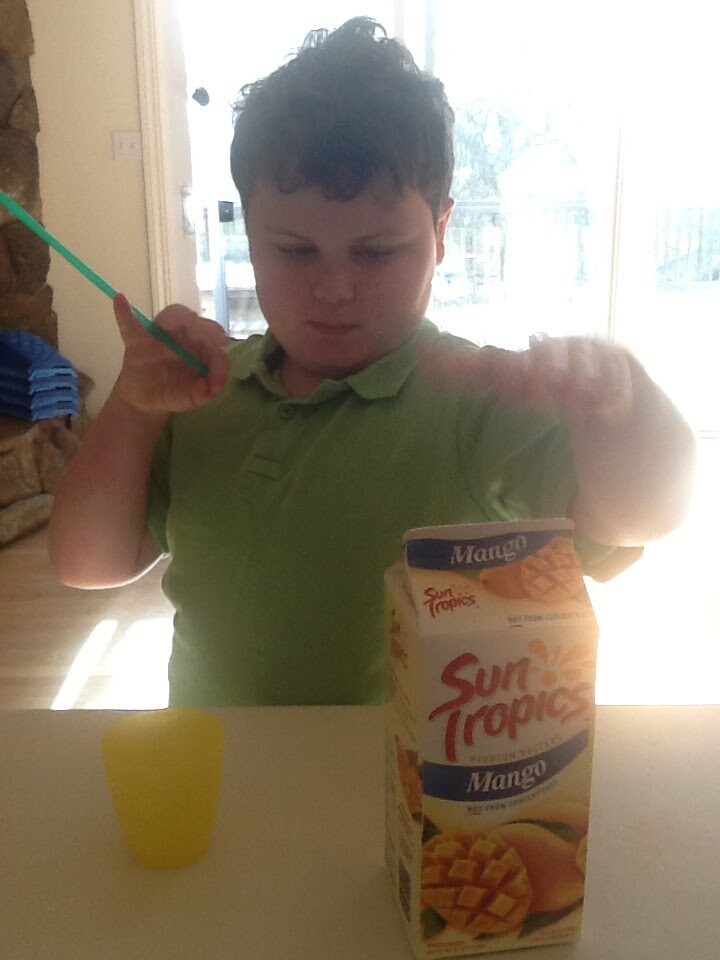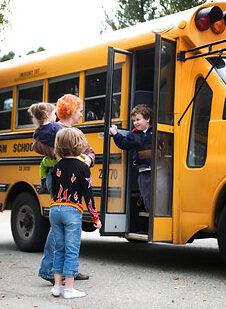Shannon Des Roches Rosa www.squidalicious.com Sometimes I think I like sameness more than my son does. That’s why a persistent hindrance to increased independence for autistic kids like my son Leo is parents like me overlooking opportunities for self-care and competence. Sometimes this happens because we find it quicker and easier to take care of breakfast preparation or our kids’ tooth brushing ourselves, sometimes because in our day-to-day rush we forget to check in and see if new skills have emerged. It takes effort and vigilance to give Leo the chances he needs to demonstrate competence. Like this past weekend, when Leo asked me for mango juice. I was about to pour it for him, but instead stepped back and asked if he wanted to pour it himself. Which he did! He even put the lid back on the carton (a twisting/screwing motion) with one hand while drinking his juice…
Tag: acceptance
Amy Sequenzia Accepting an autistic child does not mean ignoring the challenges that may be part of autism. A parent does not need to pretend that it is not hard to deal with those challenges to be accepting. Accepting autism and an autistic child is about stop mourning a child that does not exist and find the awesomeness on the autistic child in front of you. First, please read Jim Sinclair’s essay Don’t Mourn For Us. Second, I am not saying that some parents don’t love their children. What I am saying is that acceptance is about the child, or autistic adult, and their self-image. Parents cannot say they accept their autistic children if they demonize autism. I remember how it felt when my mother blamed autism for the way I did things. I felt like I was not as good as the other kids, I felt people did not…
Brenda Rothman mamabegood.blogspot.com Parents of autistic children are exposed to fears about their children way too early and too often. We hear fears about cognitive ability, fitting in, relationships, bullying, adulthood, job opportunities, independence, financial support, catching up. What we read on the internet scares us. What we read in the paper scares us. What service providers, teachers, and well-meaning people tell us scares us. Sometimes we get stuck in fear and we can’t find a way out. Our brains are wired to produce more connections to the areas we use more. So the more time we spend stuck in fear around our children and their futures, the more connections we build, the stronger those areas become. We build more neural roads between our synapses of autism and fear. We get stuck on those roads. Autistic children and adults have valid and genuine challenges. And parents need to address those. …
Our editorial team frequently discusses our expectations for autism organizations, both internally and during outreach efforts. We thought it time to formalize those expectations here on our site, as a resource for like-minded individuals. -The Editors At Thinking Person’s Guide to Autism, we believe organizations that support autistic people must adhere to the following five principles: Support, not cure: autism is a naturally occurring human neurological variation and not a disease process to be cured. Medical or health issues that may accompany autism should be addressed independently. Evidence-based medical and clinical interventions: from our inception, we have advocated for helping autistic individuals in ways that are based on peer-reviewed empirical studies and which have been deemed effective by the wider scientific and academic communities. Inclusiveness: Autistic people must have significant, meaningful, and primary roles in all aspects of the organization, especially at board and executive levels with regards to planning…
Elizabeth J. Grace www.tinygracenotes.com I haven’t seen my friend Eric in years, and we are not in touch right now because our friendship, our communion, is about hanging out together. He’s not much of a talker at all, maybe ten words? and not a writer. (And even if he were a talker, I am heinous on the phone.) Next time I am in his town, and we see each other, it will still be easy to hang out with each other as if we just left off, because we both love to sit in our sea cliff hangout hidden by sea grass and watch the ocean. We like to do this quietly. Eric is on the ball and understands what people are saying and doing. I and some others find this obvious, but not everybody does. For one thing, he knows your name if he likes you, and if he…
Colin Meloy colinmeloy.tumblr.com A friend of mine wrote me asking why I’d suggested on Twitter that people stop reading the Huffington Post, saying that the political reporting is still really strong and important. This is what I wrote in response: Hey Sarah, Yeah, so maybe I got a little short in that tweet, but it’s hard to fit detailed reasoning into 140 characters — it was mostly just a frustration vent. I clearly hit emergency levels re: HuffPo, which seems to happen too often. Agreed: a lot of the political reporting is good. The editorial is awful, though. For whatever progress is made by the clear, insightful reporting done by the site’s fine political reporters is deeply undercut by the way it’s presented, with 5,678 point type headlines manufacturing outrage and sensation over every little thing that comes across their desk. Also: the constant feed of ugly, demeaning celebrity-worship-perpetuating trash…
Kate When I was a fifteen years old, my psychiatrist told me that in ten years’ time, there would be a machine that would scan my brain and tell the doctors exactly what medicine to give me to make me normal, to make me whole. That was thirteen years ago, and though I have not yet heard of any such machine, I’ve realized that I never needed it. What I needed was acceptance. What I needed was love. These are the things that made me realize that I had, in fact, been whole all along. Sometimes, I feel as if my life were a long, cold winter, and that spring took a very long time coming. Like many autistic adults, I did not have an easy time of it growing up. Even in adulthood, I struggled with loneliness, employment, and a host of other issues. Though I was almost…
Shannon Des Roches Rosa www.squidalicious.com What I want people to know—and why I write—about parenting my autistic son Photo © Jonathan Mandel [image: A white mother with orange hair holds a toddler on her hip while standing with a young child, as a third child emerges, smiling, from a school bus.] When I realized my middle child was autistic and therefore disabled, I had a visual epiphany similar to the wide-eyed new parent who suddenly sees babies everywhere—except I saw short buses. Short buses. The kind of yellow schoolbuses that take kids like my autistic son to and from school every day. They’re everywhere, and if you don’t believe me, take a tally the next time you drive around any reasonably-sized town. Then think about all the kids who must be riding on those buses, and those kids’ parents and families. Think about all the kids who used to…
Linda at Outrunning the Storm outrunningthestorm.wordpress.com My son, Charlie fell apart last fall when kindergarten started. So did I. It was one of the darkest times in my life. But, I can say today — and I don’t say this lightly — that I am so very glad for everything that happened last year. All of it. You see, last fall I felt like my child was broken. I knew I was broken and I had no idea what to do about any of it. Most days Charlie wasn’t fit to leave the house. I stopped talking to people. What could I say? I live in fear of my five year old child’s violence? I couldn’t. I didn’t. Instead I went to my blog. Under the guise of anonymity, I went to my blog and I wrote and I wrote and then I started reading. Everyday, I read every single…
Brenda Rothman mamabegood.blogspot.com I had a lovely conversation with another mom of an autistic child, face to face, sipping coffee, while we talked about hot-button issues in the autism community. Without losing respect or good will for each other. Maybe it was the coffee. It was good coffee. We debated “cure:” why some parents want it and why autistic persons are offended by it. She said the desire for a cure would never disappear for some autism parents because their children are more severely challenged. She told me the story of a single mom with an adult autistic son, who was non-verbal, had restricted motor abilities, was self-injurious, and would never live independently. She related how difficult it is for the single mom to handle her grown child, how distraught she is about how she would care for her child as she aged, who would care for her child after…

